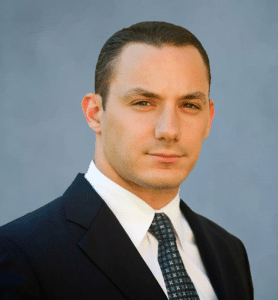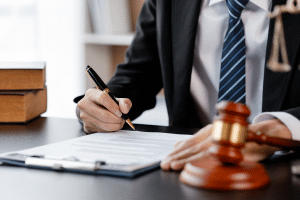This page was written, edited, reviewed & approved by Emil J. Fleysher following our comprehensive editorial guidelines. Emil J. Fleysher, the Founding Partner, has 15+ years of legal experience as a bankruptcy attorney. Our last modified date shows when this page was last reviewed.
FREE BANKRUPTCY CASE EVALUATION
 Our Florida Bankruptcy Relief Lawyer's main goal in bankruptcy law is to give debtors a financial “fresh start” from burdensome debts they can no longer afford to pay. According to the U.S. Supreme Court, bankruptcy “gives to the honest but unfortunate debtor…a new opportunity in life and a clear field for future effort, unhampered by the pressure and discouragement of preexisting debt.”
Our Florida Bankruptcy Relief Lawyer's main goal in bankruptcy law is to give debtors a financial “fresh start” from burdensome debts they can no longer afford to pay. According to the U.S. Supreme Court, bankruptcy “gives to the honest but unfortunate debtor…a new opportunity in life and a clear field for future effort, unhampered by the pressure and discouragement of preexisting debt.”
The bankruptcy discharge eliminates most debts and prohibits creditors from ever taking any action against the debtor to collect those debts. That means no more lawsuits, garnishments, phone calls, letters, emails, etc. Once you obtain your bankruptcy discharge, those debts are gone forever. Speak with an experienced Florida Bankruptcy Relief Lawyer at our firm today.
Filing your bankruptcy initially results in a negative impact to your credit score. However, upon entry of your discharge, all debts included in the bankruptcy stop affecting your score. With that, you can rapidly increase your credit score after bankruptcy by maintaining at least 2-3 accounts in good standing. Most of my clients are able to raise their credit score to approximately 700+ within one year of their bankruptcy discharge.Once your score reaches 700, you can qualify for most auto financing or lease offers, low interest or rewards credit cards, and in-store financing. Under current Fannie Mae guidelines, you can also qualify for a conventional mortgage after 4 years from the date of your bankruptcy discharge.
A bankruptcy legally can remain on your credit report for up to 10 years, but its effect on your credit score will start to diminish the day your case is closed. If you adopt responsible credit habits such as paying your bills on time, using less than 1/3 of your available credit, and not applying for too much credit at once, you’ll be in good shape a lot sooner than you think. Our firm will work with you following your bankruptcy to help ensure that you know what needs to be done to improve your credit.
 Our office typically charges between $1,700 – $2,500 to handle a personal Ch. 7 case. Your fee will depend on a number of factors including whether (1) the case is being filed individually (just you) or jointly (you and your spouse); (2) you are retired, disabled, earn a wage, or are self-employed; (3) you have unexempt assets; (4) you have an extraordinary amount of creditors or debt; and (5) whether you are in the military, police, fire rescue, or a public school employee.
Our office typically charges between $1,700 – $2,500 to handle a personal Ch. 7 case. Your fee will depend on a number of factors including whether (1) the case is being filed individually (just you) or jointly (you and your spouse); (2) you are retired, disabled, earn a wage, or are self-employed; (3) you have unexempt assets; (4) you have an extraordinary amount of creditors or debt; and (5) whether you are in the military, police, fire rescue, or a public school employee.
In Ch. 13 bankruptcy, the court has established a fee schedule and the fee to handle a Ch. 13 bankruptcy case is currently set at $4,500. There are additional fees also set by the court if you require motions to value property, cram/strip liens, etc. Filing for Ch. 13 bankruptcy is more expensive than Ch. 7 due to the added complexity and additional hearings required in order to get your payment plan confirmed by the court. It also requires that we remain in communication and maintain the case as required for the duration of the Ch. 13 payment plan which can last as long as 7 years in some cases.
The good news is that you are not required to pre-pay the entire fee since most of it can be paid over time in the Ch. 13 payment plan. The minimum amount required to get your case filed will depend on your situation and circumstances.
One important thing to find out when comparing bankruptcy attorney fees is whether you will be getting personal attention from your attorney. Depending on the way the law firm is set up to operate, you may either get an attorney that is with you every step of the way and communicates with you throughout your bankruptcy, or you may get an attorney that you only see at the initial client meeting and/or the Creditor’s Meeting. It is important to feel confident and comfortable throughout your bankruptcy and this can only be achieved if you are getting the necessary personal attention that a good bankruptcy attorney should provide.
 Your right to file for bankruptcy and discharge your debts is a very important and very powerful right. It can only be used once every 8 years and should not be exercised unless absolutely necessary. The general rule of thumb for deciding whether you should file for bankruptcy is this… if your unsecured debts are more than half your annual salary, you should seriously consider filing for bankruptcy.
Your right to file for bankruptcy and discharge your debts is a very important and very powerful right. It can only be used once every 8 years and should not be exercised unless absolutely necessary. The general rule of thumb for deciding whether you should file for bankruptcy is this… if your unsecured debts are more than half your annual salary, you should seriously consider filing for bankruptcy.
This general rule is based on the fact that if your debts are greater than your annual salary, you will probably never get out of that debt in any reasonable time frame or at a reasonable expense. Paying minimum monthly payments will take many years and you will end up paying much more over time than the original debt amount. However, if your debts are only a tiny fraction of your annual income, then you may want to consider alternatives to filing for bankruptcy.
These alternatives may include a defense and potential settlement of the debt; doing nothing if you are judgment proof; or waiting to see if the statute of limitations passes on the debts before the creditors file suit.
 If you (1) have a lot of debt; (2) don’t make a lot of money; and (3) don’t have any assets (such as a car or investment property) that can be liquidated or sold for more than a few thousand dollars, then filing Ch. 7 bankruptcy may be the fastest, easiest, and least expensive way to fix your debt problems. The Ch. 7 bankruptcy laws are set up so that if you truly and honestly cannot afford to pay your debts then you can wipe the slate clean and start over.
If you (1) have a lot of debt; (2) don’t make a lot of money; and (3) don’t have any assets (such as a car or investment property) that can be liquidated or sold for more than a few thousand dollars, then filing Ch. 7 bankruptcy may be the fastest, easiest, and least expensive way to fix your debt problems. The Ch. 7 bankruptcy laws are set up so that if you truly and honestly cannot afford to pay your debts then you can wipe the slate clean and start over.
However, if (1) your income is above the court-established limit; or (2) you have unexempt assets totaling more than $2,000 – $3,000, then you can file Ch. 13 bankruptcy and establish an affordable 3 or 5-year payment plan. The monthly payment is designed to be based on what you can afford, not the amount of your debts. In my office, clients who file Ch. 13 bankruptcy often get their discharge after paying less than 10% of their debt. Each case is different but I’m always happy to discuss potential scenarios with clients just like you.
Other reasons you may need to file a Ch. 13 bankruptcy instead of a Ch. 7 include (1) to strip a junior lien (i.e., a 2nd mortgage, HELOC, or Homeowner’s Association) from real estate; (2) to save a vehicle that is about to be repossessed; (3) to refinance a vehicle with a debt/balance that is significantly higher than the vehicle’s current value; (4) to refinance a vehicle loan that currently has a high interest rate; or (5) to discharge or reorganize your IRS/Tax debt.
Chapter 13 bankruptcy also provides the opportunity to save your home from foreclosure. When you file Ch. 13 bankruptcy, foreclosure proceedings are automatically stopped (including foreclosure sales) and you may cure the mortgage arrears over the duration of your Ch. 13 payment plan.
In either chapter, a brief meeting with the bankruptcy trustee is scheduled when your case is filed for 35-40 days out. The court usually grants the Ch. 7 discharge 3-4 months after you file the Ch. 7 bankruptcy case (2-3 months after the meeting). In a Ch. 13 bankruptcy, the discharge is entered shortly after you make your final payment under the Ch. 13 plan. In either case, all of the protections and benefits of the bankruptcy go into effect immediately upon the filing of your case. However, they do not become permanent until you receive your discharge.
Hiring an experienced bankruptcy attorney to guide you through the bankruptcy process is the best way to ensure your case goes smoothly and you do not run afoul of the bankruptcy laws and rules. When your case is prepared and executed properly, it will result in one of the most liberating and positive experiences you can have while dealing with lawyers. However, if and when a bankruptcy case goes bad, the results can be quite devastating and stressful.
My job as your bankruptcy attorney is to understand your sichtuation, circumstances, and goals so that your case is planned, drafted, and filed in a way that leads to a smooth path to discharge. I also provide a wall between you and your creditors. Hiring a bankruptcy attorney saves you the hassle and stress of dealing with harassing phone calls from creditors and provides peace of mind during throughout the bankruptcy process. If any of your creditors resume collection activity after the bankruptcy is filed, I will represent you in making sure they are punished for doing so and ensure that they never do it again.
Bankruptcy can be a painful process, but there are ways to reduce the stress involved. My ability to guide you through this process has been developed over the course of over a decade helping clients with varying circumstances and unique issues. Why not put that experience to work for you?
Our firm charges a flat fee to represent borrowers in filing for bankruptcy. We are pleased to provide payment plans to fit most budgets. Please answer the following questions to receive a quote and preliminary analysis from the attorney within 24 hours...

715 E. Hillsboro Blvd. 1st Floor
Deerfield Beach, FL 33441

800 Village Square Crossing, Suite 306
Palm Beach Gardens, FL 33410

10570 South, US-1 Suite 302
Port St. Lucie, FL 34952

1301 Riverplace Blvd., Suite 800-E,
Jacksonville, FL 32207

1222 SE 47th St
Suite C3, Cape Coral, FL 33904,


631 Lucerne Ave., Suite 40
Lake Worth, FL 33460

759 SW Federal Hwy, Suite 201H5
Stuart, FL 34994

1802 N. Alafaya Trail, Suite 203,
Orlando, FL 32826


10150 Highland Manor Dr, Suite 200-E,
Tampa, FL 33610


Emil specializes in consumer bankruptcy, debt settlement, and mortgage modification, offering a holistic approach to solving mortgage and debt problems. Emil listens to clients, understands their circumstances and goals, and helps them make the right choices by presenting all options and contingencies.
He is dedicated to helping South Floridians regain their financial freedom from overwhelming debt caused by high interest credit cards, bad mortgage loans, and uninsured medical expenses.
"*" indicates required fields

"*" indicates required fields